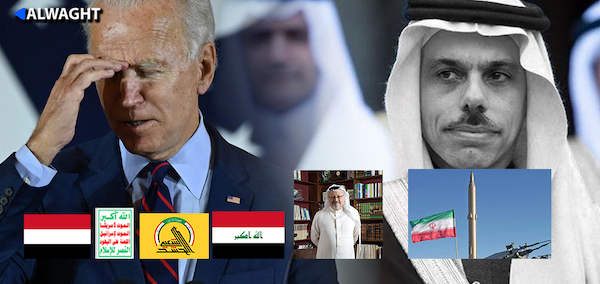In the past few weeks, Saudi officials in their media comments and interviews took stances about the relations with Iran. Despite some contradictions in their words, they seem to have set a condition for any détente with Iran and it is change of Iran’s regional policy.
Saudi Foreign Minister Faisal bin Farhan Al Saud in a recent interview with the Saudi-run news network Al-Arabiya once again highlighted what he called the "concerns" about the behavior of Iran, adding: "The region will not see stability unless the concerns of the regional states are taken into account."
Repeating unfounded accusations about "Iran’s regional interference", the Saudi FM said that the Iranian "ballistic missiles and regional interference" should be negotiated in the presence of the regional states.
He, however, at the same time said that he was "optimistic" about the effectiveness of the recent talks with Tehran, in reference to last month direct Saudi-Iranian talks hosted by Iraq.
Although from the very beginning of the diplomatic crisis in relations between the two countries and the closure of embassies, Iran has repeatedly stated its readiness to negotiate unconditionally with Saudi Arabia to reduce differences based on a principal policy of the dialogue among the regional states, there is no doubt that neither Iran has a plan to negotiate its missile or peaceful nuclear program with the Arab kingdom nor the regional circumstances, among them the upper hand of the Iran-led Axis of Resistance in the regional developments, give Saudi Arabia the possibility to set conditions for talks with the Islamic Republic.
Now there is a question: Should we take the Saudi optimism as a product of an imagination and Riyadh’s unrealistic view? Or there is something else behind the Saudi stances?
Certainly, part of the Saudi contradictory positions on the negotiations is an outcome of the confusion caused by the failure of Crown Prince Mohammed bin Salman’s aggressive policies against the regional rivals. The disgraceful defeat and disintegration of the Saudi-led coalition in Yemen, the defeat in the siege of Qatar and the retreat from the initial positions to lift the siege, the failure of the Saudi-sponsored takfiri terrorists in the Syrian war and marginalization of the Riyadh-supported Syrian opposition in the future talks, the failure of the project to destabilize the countries of Axis of Resistance with the economic shocks given by the Trump administration, the greater failure to advance social reforms to improve Saudi Arabia’s image on the international arena, especially the Western media, and the start of the process of the US expulsion from the region at the hands of the Resistance camp have turned Riyadh into a major loser of the regional developments during the chaotic last decade.
However, Saudi Arabia and Prince Mohammed, who is eager to ascend the throne, find themselves inevitable to take steps to assuage these major problems in foreign policy. Such an approach is by no means a choice of the Saudis themselves but Riyadh is seeking negotiations with Iran as a result of the international pressures on Riyadh that followed assassination of the outspoken Saudi critic Jamal Khashoggi at his country’s consulate in Istanbul, the assumption of power by the Democrats in the US who are critical of the Saudi policies, and also the heavy pressures of the nearly daily retaliatory missile and drone attacks of the Yemeni forces on the Saudi oil and economic infrastructures.
But despite this necessity, Saudi Arabia still has no will to end the current greatest tragedy of its foreign policy, namely the war in Yemen, and is looking for an alternative solution to move developments toward its desired order in that country. Ansarullah, the leading revolutionary movement in Yemen, is now more powerful than ever in the developments and sets stop of the Saudi air operations and relief of the siege on Yemen as the precondition to engage in ceasefire talks. Iran, as a regional supporter and strategic partner of Ansarullah, has repeatedly stated that it will help facilitate talks between Ansarullah and Riyadh if the latter prepares to stop the illegitimate war and the inhumane siege on Yemen.
In recent days, Iraqi officials, who have hosted talks between Iranian and Saudi representatives last month, have told media that the issue of the Yemeni war has been the most important agenda in the first round of talks. Saudi Arabia appears to have planned talks in Baghdad to stop Ansarullah’s attacks on oilfields and to stop Sanaa forces’ advances on the Ma’rib front. Given this necessity, the Saudis have no cards in the talks with Tehran. Therefore, calling for a role in the Western nuclear talks with Iran and also calling for Iran to limit its ballistic missile program is meant to influence the talks and wrest concessions from the Western diplomatic front.
Still, what can take the Saudis out of the current impasse is reviewing their hostile and belligerent policy that has been a source of regional instability and crisis over the past decade in such countries as Iraq, Syria, Yemen, and Lebanon. It is only through rethinking and altering policy, and not the empty imagination of imposing preconditions on the Resistance camp, that Riyadh can expect fruitfulness of the negotiations and improvement of bilateral relations with Tehran.













